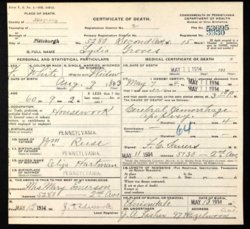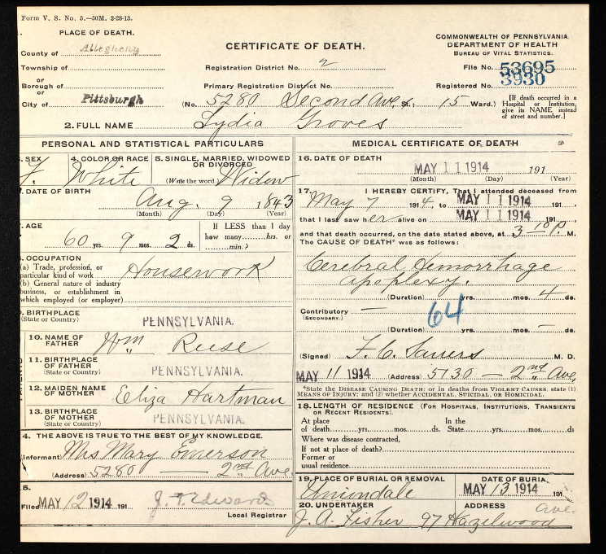ali. Lydie, Lida
b. 1853, Columbia, PA
Married CW Veteran William Groves m. 15 Apr 1871, Marietta, Lancaster Co., PA
d. 1914, Pittsburgh, Allegheny Co., PA
bur. Uniondale Cemetery
buried with her daughter and son in law
Children
Annette “Nettie” GROVES (25 Aug 1874 - 18 Feb 1950)
Jesse M. GROVES (4 Nov 1877 - )
Henry “Harry” Hinkle GROVES (14 Apr 1880 - )
Annie May GROVES (23 Nov 1883 - )
Gertrude Bowers GROVES (27 May 1887 - )
NOTE ON HUSBAND
A GAR VETERAN
CW Veteran
Cavalry
Fought with Sherman at one of last battles of CW AFTER Lee surrendered at BENTONVILLE NC. Sherman met and defeated Gen Joe Johnston there.
occ. Railroad Engineer
BENTONVILLE
The Battle of Bentonville (March 19–21, 1865) was fought in Bentonville, North Carolina, near the town of Four Oaks, as part of the Carolinas Campaign of the American Civil War. It was the last battle between the armies of Union Maj. Gen. William T. Sherman and Confederate Gen. Joseph E. Johnston.
As the right wing of Sherman's army under command of Maj. Gen. Oliver O. Howard marched toward Goldsborough, the left wing under command of Maj. Gen. H. W. Slocum encountered the entrenched men of Johnston's army.
On the first day of the battle, the Confederates attacked the XIV Corps and routed two divisions, but the rest of Sherman's army defended its positions successfully.
The next day, as Sherman sent reinforcements to the battlefield and expected Johnston to withdraw, only minor sporadic fighting occurred.
On the third day, as skirmishing continued, the division of Maj. Gen. Joseph A. Mower followed a path into the Confederate rear and attacked.
The Confederates were able to repulse the attack as Sherman ordered Mower back to connect with his own corps.
Johnston elected to withdraw from the battlefield that night.
As a result of the overwhelming Union strength and the heavy casualties his army suffered in the battle, Johnston surrendered to Sherman little more than a month later at Bennett Place, near Durham Station.
Coupled with Gen. Robert E. Lee's surrender earlier in April, Johnston's surrender represented the effective end of the war.
ali. Lydie, Lida
b. 1853, Columbia, PA
Married CW Veteran William Groves m. 15 Apr 1871, Marietta, Lancaster Co., PA
d. 1914, Pittsburgh, Allegheny Co., PA
bur. Uniondale Cemetery
buried with her daughter and son in law
Children
Annette “Nettie” GROVES (25 Aug 1874 - 18 Feb 1950)
Jesse M. GROVES (4 Nov 1877 - )
Henry “Harry” Hinkle GROVES (14 Apr 1880 - )
Annie May GROVES (23 Nov 1883 - )
Gertrude Bowers GROVES (27 May 1887 - )
NOTE ON HUSBAND
A GAR VETERAN
CW Veteran
Cavalry
Fought with Sherman at one of last battles of CW AFTER Lee surrendered at BENTONVILLE NC. Sherman met and defeated Gen Joe Johnston there.
occ. Railroad Engineer
BENTONVILLE
The Battle of Bentonville (March 19–21, 1865) was fought in Bentonville, North Carolina, near the town of Four Oaks, as part of the Carolinas Campaign of the American Civil War. It was the last battle between the armies of Union Maj. Gen. William T. Sherman and Confederate Gen. Joseph E. Johnston.
As the right wing of Sherman's army under command of Maj. Gen. Oliver O. Howard marched toward Goldsborough, the left wing under command of Maj. Gen. H. W. Slocum encountered the entrenched men of Johnston's army.
On the first day of the battle, the Confederates attacked the XIV Corps and routed two divisions, but the rest of Sherman's army defended its positions successfully.
The next day, as Sherman sent reinforcements to the battlefield and expected Johnston to withdraw, only minor sporadic fighting occurred.
On the third day, as skirmishing continued, the division of Maj. Gen. Joseph A. Mower followed a path into the Confederate rear and attacked.
The Confederates were able to repulse the attack as Sherman ordered Mower back to connect with his own corps.
Johnston elected to withdraw from the battlefield that night.
As a result of the overwhelming Union strength and the heavy casualties his army suffered in the battle, Johnston surrendered to Sherman little more than a month later at Bennett Place, near Durham Station.
Coupled with Gen. Robert E. Lee's surrender earlier in April, Johnston's surrender represented the effective end of the war.
Family Members
Sponsored by Ancestry
Advertisement
Explore more
Sponsored by Ancestry
Advertisement





